General Cover Letter for Hospitality Job
Dear Hiring Manager,
I am writing to express my interest in the available position within your hospitality team. With a strong background in customer service and a passion for creating memorable experiences, I am confident in my ability to contribute positively to your establishment.
I have previous experience working in hotels and restaurants, where I developed skills in guest relations, event coordination, and teamwork. I pride myself on attention to detail, adaptability, and maintaining a welcoming environment for all guests.
I would welcome the opportunity to discuss how my skills and enthusiasm align with your team’s needs. Thank you for considering my application.
Sincerely,
[Your Name]
Email Cover Letter for Seasonal Tourism Job
Subject: Application for Seasonal Tour Guide Position
Hello [Hiring Manager's Name],
I am excited to apply for the seasonal tour guide role at [Company Name]. My previous experience leading groups, sharing cultural insights, and ensuring safety during tours makes me a great fit for this position.
I am flexible with schedules and eager to create engaging experiences for all visitors. Attached is my resume for your review, and I am happy to provide references if required.
Looking forward to your response.
Best regards,
[Your Name]
Formal Cover Letter for Catering Job
Dear [Manager's Name],
I am submitting my application for the catering assistant position at [Company Name]. With over three years of experience in food preparation, menu planning, and event service, I bring both professionalism and a passion for delivering exceptional culinary experiences.
My attention to hygiene, timely service, and teamwork ensures smooth operations in high-pressure environments. I am confident that my skills can support your team in achieving successful events consistently.
Thank you for considering my application. I would be pleased to discuss my qualifications further at your convenience.
Sincerely,
[Your Name]
Casual Email for Entry-Level Hotel Job
Subject: Excited to Join Your Hotel Team!
Hi [Hiring Manager's Name],
I’m very interested in the front desk assistant role at [Hotel Name]. I recently completed a hospitality training course and am eager to bring my enthusiasm and friendliness to your guests.
I work well with people, enjoy solving problems, and am always ready to learn. I’d love the chance to chat about how I can help your team.
Thanks so much,
[Your Name]
Heartfelt Cover Letter for Tourism Internship
Dear [Supervisor's Name],
I am applying for the tourism internship at [Company Name] because I am passionate about travel, culture, and connecting people with memorable experiences. This opportunity aligns perfectly with my studies in hospitality and my desire to learn from industry professionals.
I bring a positive attitude, eagerness to contribute, and dedication to every task I undertake. I am excited to gain hands-on experience and grow within your team.
Thank you for considering my application.
Warm regards,
[Your Name]
Quick Message for Catering Shift Coverage
Hello [Manager's Name],
I am available to cover the catering shift on [Date]. Please confirm if my assistance is needed.
Thank you,
[Your Name]
Formal Letter for Restaurant Manager Position
Dear [Hiring Manager's Name],
I am writing to express my interest in the Restaurant Manager role at [Company Name]. With over five years of management experience in high-volume restaurants, I have developed skills in staff supervision, inventory management, and customer satisfaction optimization.
I thrive in dynamic environments, prioritize team development, and implement efficient operational procedures. I am confident that my leadership skills can contribute to your establishment’s continued success.
I look forward to the possibility of an interview to discuss my qualifications further.
Sincerely,
[Your Name]
What is a Cover Letter for Food, Hospitality, Tourism, and Catering Jobs and Why You Need One
A cover letter in this industry is a professional document or message sent to express interest in a job and highlight relevant skills and experiences.
It serves to:
- Introduce yourself to potential employers.
- Highlight specific skills relevant to hospitality, tourism, or catering.
- Showcase personality, professionalism, and fit for the role.
- Provide context for your resume and explain gaps or unique experiences.
- Encourage the recipient to invite you for an interview.
Who Should Send These Letters
- Job seekers applying to hotels, restaurants, catering services, or tourism companies.
- Students and interns seeking hands-on experience.
- Professionals changing roles within the hospitality sector.
- Individuals applying for seasonal or temporary positions.
- Freelancers or consultants offering services to multiple hospitality clients.
Whom These Letters Should Be Addressed To
- Hiring Managers or Recruitment Officers in hotels, restaurants, or tourism companies.
- Supervisors or department heads for specific roles (e.g., Head Chef, Front Desk Manager).
- Internship coordinators or training managers for student programs.
- Event managers when applying for catering or event-related roles.
- HR departments for general applications.
When to Send a Cover Letter in This Industry
- When applying for full-time, part-time, or temporary positions.
- During seasonal recruitment (summer, holidays).
- When seeking internships or training programs.
- To request shift coverage or volunteer work in hospitality.
- To apply for promotions or transfers within the same organization.
How to Write and Send a Cover Letter
- Start with research: understand the company, role, and culture.
- Decide the tone: formal for management roles, casual or creative for internships or creative positions.
- Structure your letter: greeting, introduction, skills/experience, closing.
- Keep it concise: 3–4 short paragraphs are ideal.
- Choose mode of sending: email for quick applications, letter for formal or printed applications.
- Personalize each letter with the recipient's name and specific role.
Requirements and Prerequisites Before Writing
- A current and polished resume or CV.
- Knowledge of the company and role.
- Relevant certifications (e.g., food safety, hospitality training).
- Availability for shifts or seasonal work.
- Portfolio or references if applicable (e.g., catering experience, customer feedback).
- Professional email address for digital applications.
Formatting Guidelines
- Length: typically one page.
- Tone: matches the role (formal, casual, creative, heartfelt).
- Style: clear, structured paragraphs with headings if necessary.
- Wording: concise, positive, action-oriented.
- Mode: email or printed letter based on employer preference.
- Etiquette: avoid slang, proofread, maintain professional formatting.
Elements and Structure of a Cover Letter
- Subject line (for emails).
- Greeting addressing the correct person.
- Introduction: express interest and reason for applying.
- Core paragraphs: highlight experience, skills, and accomplishments.
- Closing: request for interview or next steps.
- Signature and contact information.
- Attachments: resume, certifications, portfolio, if required.
After Sending / Follow-up
- Wait 5–7 business days before following up.
- Send a polite email if you haven’t received a response.
- Keep the follow-up short and professional.
- Prepare for an interview by reviewing the company and role.
- Maintain records of all applications sent and responses received.
Common Mistakes to Avoid
- Sending a generic letter to multiple employers.
- Ignoring proper grammar and spelling.
- Overloading with unnecessary details.
- Using an inappropriate tone for the position.
- Forgetting to include contact information or attachments.
- Addressing the letter to the wrong person or department.
Pros and Cons of Sending a Cover Letter
Pros:
- Personalizes your application.
- Highlights unique skills and experiences.
- Demonstrates professionalism and effort.
Cons:
- Time-consuming to personalize for each job.
- May be overlooked if employer prioritizes resumes.
- Poorly written letters can harm your chances more than not sending one.
Tricks and Tips for Effective Letters
- Use bullet points to highlight key achievements.
- Match keywords from the job description.
- Keep the introduction engaging and relevant.
- Tailor tone according to the company culture.
- Use a clear, readable font and format.
- Include measurable results when possible (e.g., increased customer satisfaction by 15%).
- Maintain enthusiasm and positivity throughout.
FAQ
Q: Should I attach my resume?
A: Yes, always attach your resume unless instructed otherwise.
Q: Can I send the same letter to multiple employers?
A: Only if you customize the greeting and role details for each company.
Q: How long should the letter be?
A: Ideally one page or 250–350 words.
Q: Do I need to include references?
A: Only if requested or relevant to the position.
Q: Can I use humor?
A: Only for casual roles or creative positions; remain professional for management roles.
Compare and Contrast with Other Application Methods
- Cover Letter vs Resume: Resume lists facts and achievements; cover letter explains motivation and fit.
- Cover Letter vs Online Application Form: Forms may not allow personality or context; letters give room for explanation.
- Cover Letter vs Networking Message: Networking messages are informal and relationship-focused; letters are formal and position-focused.
- Alternative: A short email with resume attached can sometimes substitute for a formal letter in digital applications.
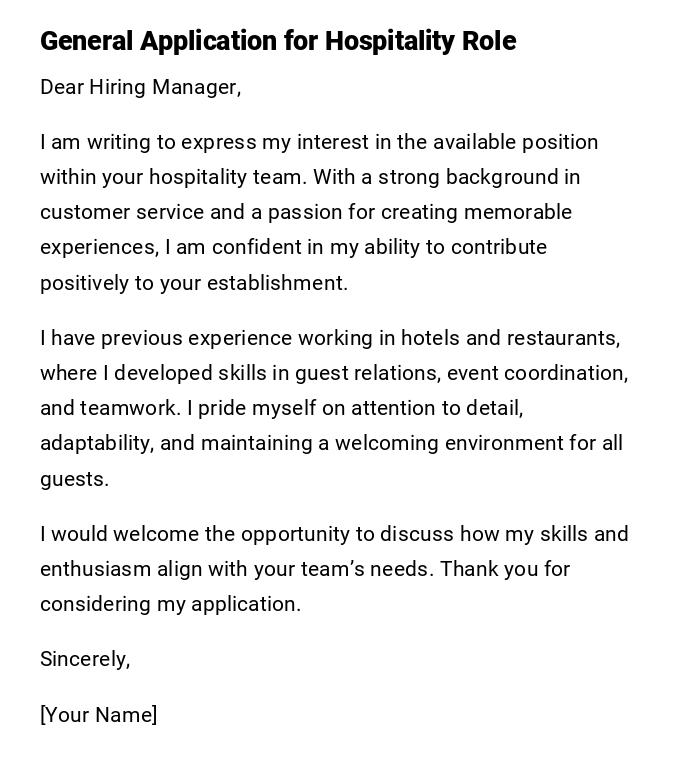
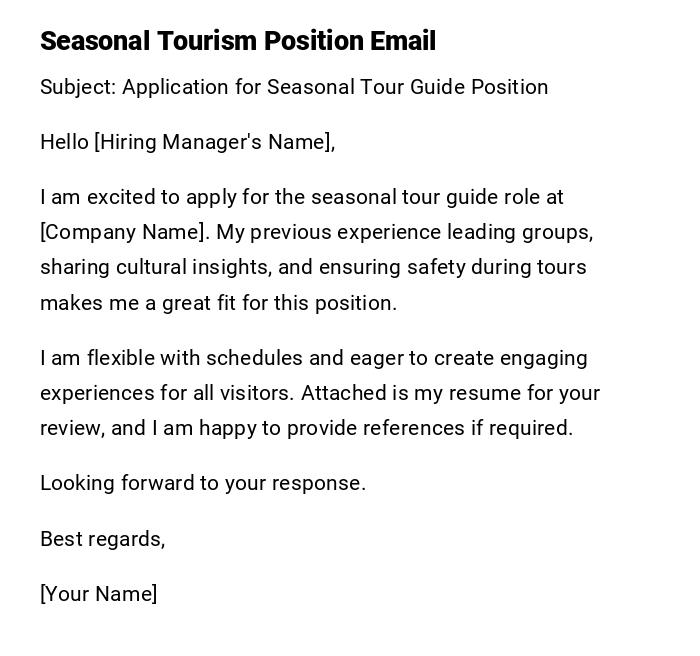
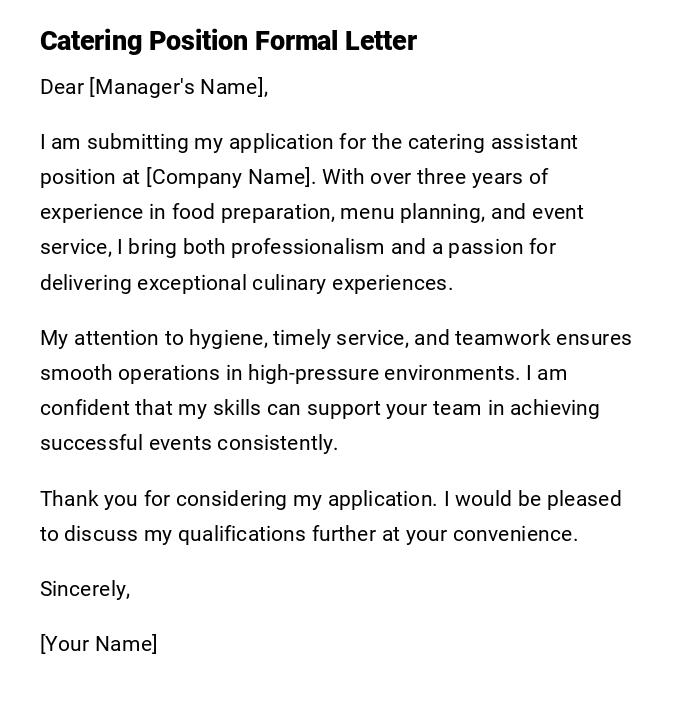
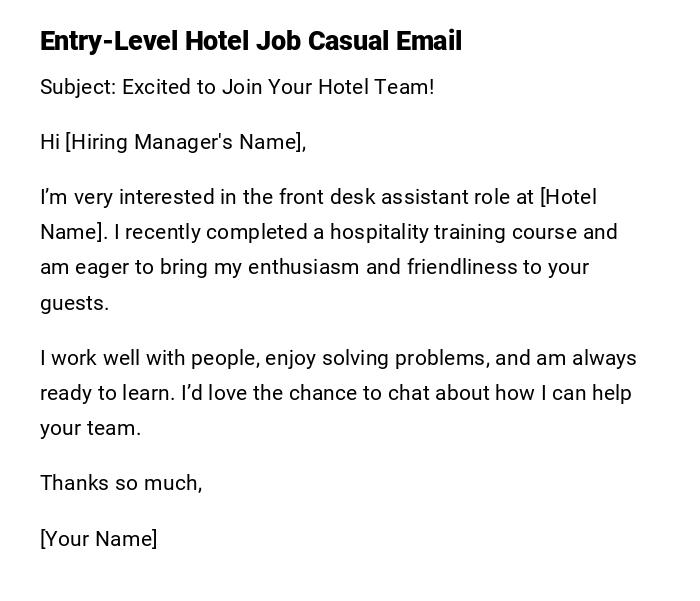
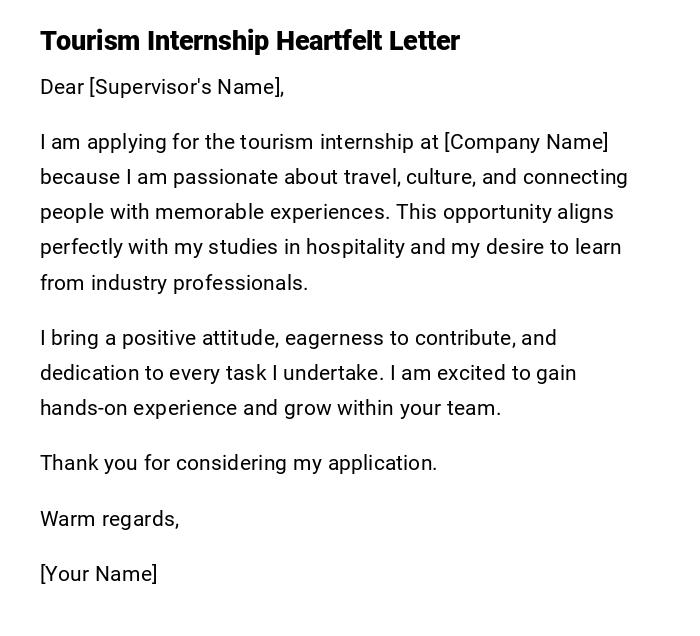
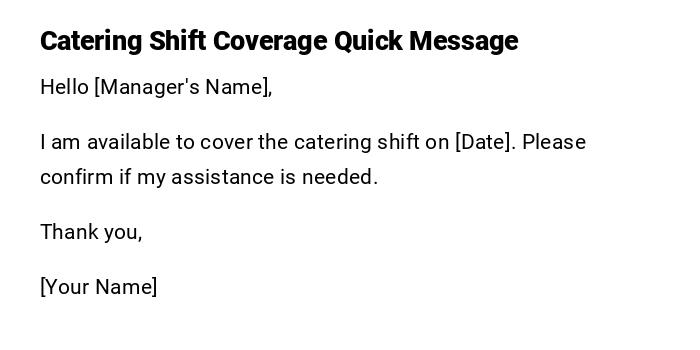
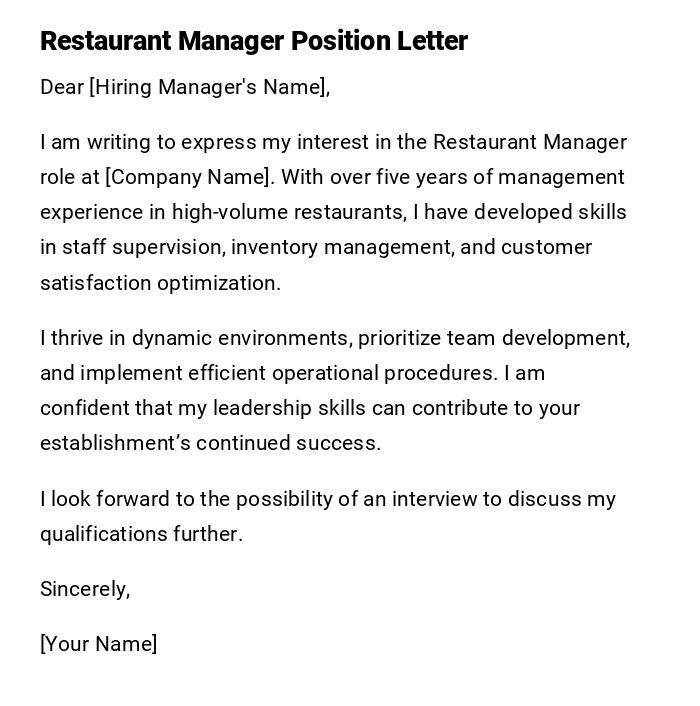

 Download Word Doc
Download Word Doc
 Download PDF
Download PDF